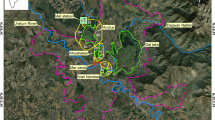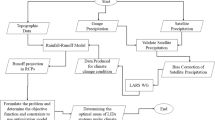Abstract
In recent decades, Algeria has experienced rapid and irregular demographic growth, and this irregular change has inevitably led to periodic floods threatening human life. Urbanization, an anthropogenic cause, is rapidly evolving and has been considered as a non-negligible part in altering land use and land cover (LULC), despite the fact that precipitation characteristics are related to the climate of the region and may change over time. It is therefore essential to assess the changes in runoff as a result of LULC changes. Awareness of the relationship of rainfall and runoff is necessary for urban drainage network modeling and design. The implementation of Low-Impact Development (LID) is a popular strategy to minimize stormwater runoff and pollutant loads. In developed countries, software to estimate impacts of certain LID controls has expanded in recent years; however, readily available modeling approaches are still in high demand in developing countries, such as Algeria. In this article, we seek methods that can decrease runoff peaks and volume for the Guelma watershed located in northeast Algeria by integrating the Personal Computer Storm Water Management Model (PCSWMM) and a geographic information system (GIS). PCSWMM calibration is conducted by using the sensitivity-based radio tuning calibration tool. The Nash–Sutcliffe efficiency (NSE) (0.70–0.88), coefficient of determination (R2) (0.76–0.96), and relative error (RE) (0.018–0.23) indicated good model performance in this urban watershed. The implementation of five LID practices, including permeable pavements, bioretentions, rain gardens, infiltration trenches, and rainwater harvesting systems, in scenarios explored could reduce peak runoff by 54.7% and reduce total runoff volume by 75.2%. The current research will assist decision-makers in improving and choosing the most appropriate LID designs that are effective in view of future climate changes and changes in LULC. This study can contribute to further applications of rainfall–runoff models in Algeria.






Similar content being viewed by others
References
Ahiablame LM, Engel BA, Chaubey I (2012) Effectiveness of low impact development practices: literature review and suggestions for future research. Water Air Soil Pollut 223(7):4253–4273. https://doi.org/10.1007/s11270-012-1189-2
Aryal R, Vigneswaran S, Kandasamy J, Naidu R (2010) Urban stormwater quality and treatment urban stormwater quality and treatment. September. 27:1343–1359. https://doi.org/10.1007/s11814-010-0387-0
Astuti IS, Sahoo K, Milewski A, Mishra DR (2019) Impact of land use land cover (LULC) change on surface runoff in an increasingly urbanized tropical watershed. Water Resour Manag 33(12):4087–4103. https://doi.org/10.1007/s11269-019-02320-w
Babaei S, Ghazavi R, Erfanian M (2020) Corrigendum to “Urban flood simulation and prioritization of critical urban sub-catchments using SWMM model and PROMETHEE II approach” [physics and chemistry of the earth, part A/B/C. 105 (2018) 3–11] Physics and Chemistry of the Earth (2018) 105 (3–11). Phys Chem Earth 116(2019):102802. https://doi.org/10.1016/j.pce.2019.10.001
Bae C, Lee DK (2020) Effects of low-impact development practices for flood events at the catchment scale in a highly developed urban area. International Journal of Disaster Risk Reduction 44:101412. https://doi.org/10.1016/j.ijdrr.2019.101412
Chen J, Theller L, Gitau MW, Engel BA, Harbor JM (2017) Urbanization impacts on surface runoff of the contiguous United States. J Environ Manag 187:470–481. https://doi.org/10.1016/j.jenvman.2016.11.017
Chow MF, Yusop Z (2012) Modelling runoff quantity and quality in tropical urban catchments using Storm Water Management Model. October. 9:737–748. https://doi.org/10.1007/s13762-012-0092-0
Coffman LS (2004) Low impact development: smart technology for clean water. Communities, May 2007:1–11
Dakhlalla AO, Parajuli PB (2016) Evaluation of the best management practices at the watershed scale to attenuate peak streamflow under climate change scenarios. Water Resour Manag 30(3):963–982. https://doi.org/10.1007/s11269-015-1202-9
Dietz ME (2007) Low impact development practices : a review of current research and recommendations for future directions. 351–363. 186:351–363. https://doi.org/10.1007/s11270-007-9484-z
Dietz ME, & Clausen JC (2008). Stormwater runoff and export changes with development in a traditional and low impact subdivision. 87:560–566
Eckart K, Mcphee Z, Bolisetti T (2017a) Science of the total environment performance and implementation of low impact development – a review ☆. Sci Total Environ 607–608:413–432. https://doi.org/10.1016/j.scitotenv.2017.06.254
Eckart K, McPhee Z, Bolisetti T (2017b) Performance and implementation of low impact development – a review. Sci Total Environ 607–608:413–432. https://doi.org/10.1016/j.scitotenv.2017.06.254
Energy G (2018). New trends in urban drainage modelling_ UDM 2018.pdf
Fletcher TD, Shuster W, Hunt WF, Ashley R, Butler D, Arthur S, Trowsdale S, Barraud S, Semadeni-Davies A, Bertrand-Krajewski JL, Mikkelsen PS, Rivard G, Uhl M, Dagenais D, Viklander M (2015) SUDS, LID, BMPs, WSUD and more – the evolution and application of terminology surrounding urban drainage. Urban Water J 12(7):525–542. https://doi.org/10.1080/1573062X.2014.916314
Gironás J, Roesner LA, Davis J (2009) Storm water management model. Applications Manual EPA/600/R-09/077. J Am Water Resour Assoc 107(11):1–179. https://doi.org/10.1111/j.1752-1688.1990.tb01394.x
Goncalves MLR, Zischg J, Rau S, Sitzmann M, Rauch W, Kleidorfer M (2018) Modeling the effects of introducing low impact development in a tropical city: a case study from Joinville, Brazil. Sustainability (Switzerland) 10(3). https://doi.org/10.3390/su10030728
Guo X, Du P, Zhao D, Li M (2019) Modelling low impact development in watersheds using the storm water management model. Urban Water J 16(2):146–155. https://doi.org/10.1080/1573062X.2019.1637440
Hamouz V, Møller-Pedersen P, Muthanna TM (2020) Modelling runoff reduction through implementation of green and grey roofs in urban catchments using PCSWMM. Urban Water J 17(9):813–826. https://doi.org/10.1080/1573062X.2020.1828500
Hancock GR (2005) The use of digital elevation models in the identification and characterization of catchments over different grid scales. Hydrol Process 19(9):1727–1749. https://doi.org/10.1002/hyp.5632
Jiang L, Ling D, Zhao M, Wang C, Liang Q, Liu K (2018) Effective identification of terrain positions from gridded DEM data using multimodal classification integration. ISPRS Int J Geo Inf 7(11). https://doi.org/10.3390/ijgi7110443
Laouacheria F, Mansouri R (2015) Comparison of WBNM and HEC-HMS for runoff hydrograph prediction in a small urban catchment. Water Resour Manag 29(8):2485–2501. https://doi.org/10.1007/s11269-015-0953-7
Laouacheria F, Kechida S, Chabi M (2019) Modelling the impact of design rainfall on the urban drainage system by Storm Water Management Model. Journal of Water and Land Development 40(1):119–125. https://doi.org/10.2478/jwld-2019-0013
Li C, Liu M, Hu Y, Han R, Shi T, Qu X, Wu Y (2018) Evaluating the hydrologic performance of low impact development scenarios in a micro urban catchment. Int J Environ Res Public Health 15(2). https://doi.org/10.3390/ijerph15020273
Nash JE, Sutcliffe JV (1970) River flow forecasting through conceptual models part I — a discussion of principles. J Hydrol 10(3):282–290. https://doi.org/10.1016/0022-1694(70)90255-6
Oyekola MA, Adewuyi GK (2018) Unsupervised classification in land cover types using remote sensing and GIS techniques. International Journal of Science and Engineering Investigations 7(72):11–18
Palla A, Gnecco I (2015) Hydrologic modeling of Low Impact Development systems at the urban catchment scale. J Hydrol 528:361–368. https://doi.org/10.1016/j.jhydrol.2015.06.050
Peng Z, Jinyan K, Wenbin P, Xin Z, Yuanbin C (2019) Effects of low-impact development on urban rainfall runoff under different rainfall characteristics. Pol J Environ Stud 28(2):771–783. https://doi.org/10.15244/pjoes/85348
Printing F, Printing S, Huber W C, & Dickinson R E (1992). Storm water management model, version 4 : user’s manual. August 1988
Rabori AM, Ghazavi R (2019) Urban flood estimation and evaluation of the performance of an urban drainage system in a semi-arid urban area using SWMM. Water Environ Res. https://doi.org/10.1002/wer.1083
Randall M, Sun F, Zhang Y, Jensen MB (2019) Evaluating Sponge City volume capture ratio at the catchment scale using SWMM. J Environ Manag 246(January):745–757. https://doi.org/10.1016/j.jenvman.2019.05.134
Rossman, Lewis A. (2004). Storm water management model user manual. Version 5 US Environmental Protection Agency November
Rossman (2015). Storm water management model user’s manual version 5.1. National Risk Management Laboratory Office of Research and Development. United States Environmental Protection Agency, Cincinnati, Ohio., September, 352. http://nepis.epa.gov/Exe/ZyPDF.cgi?Dockey = P100N3J6.TXT
Sajikumar N, Remya RS (2014) Impact of land cover and land use change on runoff characteristics. J Environ Manag 161:460–468. https://doi.org/10.1016/j.jenvman.2014.12.041
Taillon A (1991). Classification de I’occupation des sols à des fins hydrologiques
Talbot M, McGuire O, Olivier C, Fleming R (2016) Parameterization and application of agricultural best management practices in a rural Ontario watershed using PCSWMM. Journal of Water Management Modeling:1–10. https://doi.org/10.14796/jwmm.c400
Zhang, Chui TFM (2018) A comprehensive review of spatial allocation of LID-BMP-GI practices: strategies and optimization tools. Sci Total Environ 621:915–929. https://doi.org/10.1016/j.scitotenv.2017.11.281
Zhu Z, Chen Z, Chen X, Yu G (2019) An assessment of the hydrologic effectiveness of low impact development (LID) practices for managing runoff with different objectives. 231(2018):504–514. https://doi.org/10.1016/j.jenvman.2018.10.046
Acknowledgements
The authors would like to acknowledge CHI, Canada for submitting a license to use PCSWMM software for the current project through its subsidiary, Hydro-Praxis, French. We also sincerely thank CHI engineers for being available to provide support regarding understanding and using the model.
Author information
Authors and Affiliations
Corresponding author
Additional information
Responsible Editor: Broder J. Merkel
Supplementary Information
ESM 1
(DOCX 21.9 kb)
Rights and permissions
About this article
Cite this article
Abdelkebir, B., Maoui, A., Mokhtari, E. et al. Evaluating Low-Impact Development practice performance to reduce runoff volume in an urban watershed in Algeria. Arab J Geosci 14, 814 (2021). https://doi.org/10.1007/s12517-021-07178-0
Received:
Accepted:
Published:
DOI: https://doi.org/10.1007/s12517-021-07178-0




